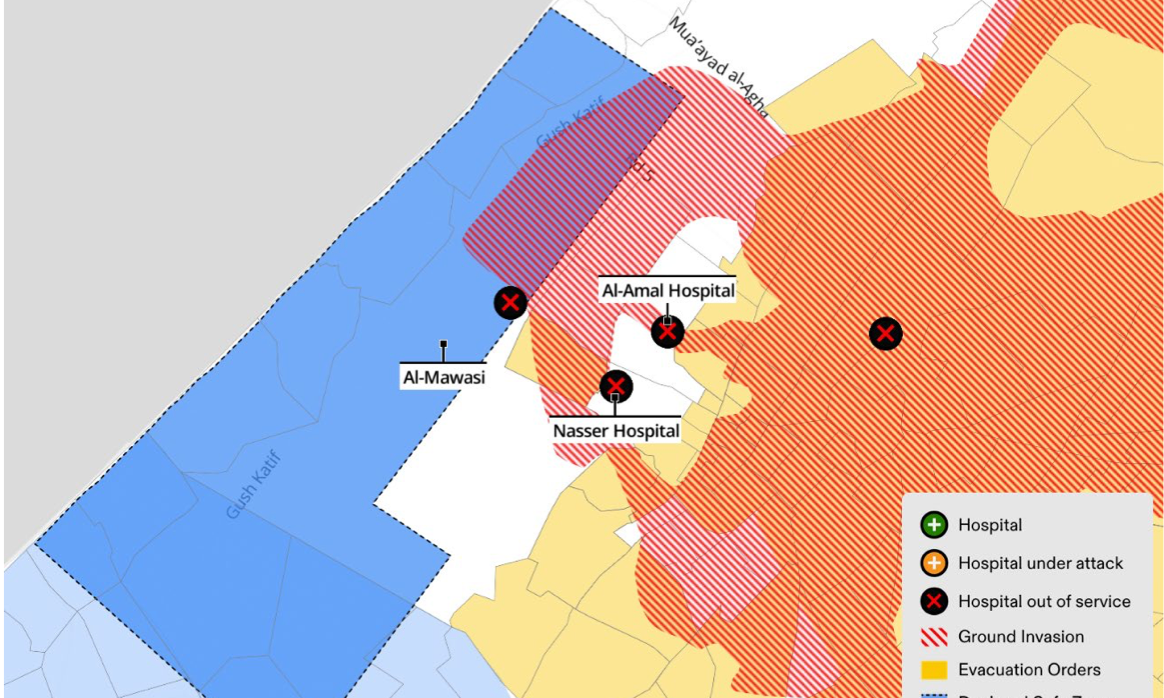A map of Gaza created by Forensic Architecture showing evacuation orders by the Israeli military up until 22 January (yellow).
Courtesy of Forensic Architecture
A new report by the research group and art collective Forensic Architecture backs claims made by South Africa in The Hague in January that Israel is exercising a form of “humanitarian violence” in Gaza as it drives Palestinian civilians towards the southern border of Gaza as part of what the report describes as a “genocidal military campaign”.
In its defence at the International Court of Justice (ICJ) hearing, Israel claimed that it has implemented “humanitarian measures” to prevent the loss of civilian life in Gaza, including the creation and co-ordination of “safe corridors” and “safe zones” for people to be evacuated to, as well as providing advance warnings of attacks via leaflet drops and radio and social media messaging. Israel argued that these practices represented a “genuine humanitarian effort” to protect civilian lives in its crackdown on Hamas following the 7 October attacks, in which around 1,200 people died.
Forensic Architecture's report tests those claims using open-source intelligence, social media posts by the Israeli military, digital modelling and eye-witness testimonies. Covering the period from 8 October to 16 February, the report notes that evacuation instructions and accompanying maps have contained unclear, incorrect, inconsistent and conflicting instructions amounting to a kind of “cartographic terror”. Instead of evacuating civilians to safe places with adequate medical and housing infrastructure, Israel has sent hundreds of thousands of people to zones that have subsequently been targeted by the military, leading to “significant civilian fatalities”.
As of 17 February, as many as 1.7 million people have been displaced across Gaza, many of them multiple times, according to the UN Relief and Works Agency. Media reports say the Israeli military has now killed more than 30,000 Palestinians, at least 70% of them women and children.
As the British-Israeli architect Eyal Weizman, who founded Forensic Architecture in 2010, puts it: “Israel’s defence at the ICJ relied greatly on it instituting these humanitarian zones, warnings and evacuation orders. And with this, they were trying to argue that actually they are trying to save lives, rather than, as accused, engaging in genocidal acts. In fact, when we looked at the correlation between evacuation orders and where people were actually sent, we saw very often people were sent to areas that had no adequate infrastructure. Furthermore, people were being attacked by the military in these zones.”
In its provisional ruling, the ICJ made a number of legal requirements of Israel, including taking all measures to prevent intentional harm to civilians, facilitating immediate humanitarian aid to Gaza and preventing and punishing direct or public incitement to genocide.
The Forensic Architecture report says Israel is now in contravention of that order. “Since the ruling, Israel has continued the expulsion and forced displacement of Palestinians from their homes and deprived them of access to adequate food and water, humanitarian assistance, fuel, shelter, clothes, hygiene, sanitation and medical care,” the report says.
The first evacuation order for northern Gaza was disseminated via airdropped leaflets on 13 October. The order instructed all people residing north of Wadi Gaza, around 1.1 million Palestinians, to evacuate their homes within 24 hours and head south of Wadi Gaza—dividing a new north and south in Gaza. The leaflet stated: “It is forbidden to approach the security wall, and anyone who approaches exposes himself to death.”
On 22 October, another airdropped leaflet warned residents in the north that “whoever chooses not to leave north Gaza to the south of Wadi Gaza might be identified as an accomplice in a terrorist organisation”. According to the Forensic Architecture report, the orders “acted as a form of collective punishment”.
On 2 December 2023, the Israeli military began instructing Palestinians in areas south of Wadi Gaza—including Khan Younis and refugee camps in the middle of the Gaza Strip—to evacuate. Previously designated as “safe”, these areas had offered refuge to thousands of displaced people from the north of Gaza, compelling them to undergo another phase of mass displacement.
There are at present three areas in the Gaza Strip designated by the Israeli military as “safe zones”: Rafah, Deir Al-Balah, and Al-Mawasi—but the Forensic Architecture report notes that they too are subject to invasion. The campus of Al-Aqsa University was forcefully evacuated during January, although the area did not receive any official evacuation order. Hospitals and schools sheltering displaced people including Al-Shifa and Al-Quds hospitals have also been attacked and depopulated.
Testimonies provided by doctors working in so-called “safe zones” for Palestinians describe their unliveable conditions. The physician Yipeng Ge says he saw numerous cases of malnourishment, acute infections and injuries and burns from airstrikes during his time in Gaza. “The reason for these conditions presenting both in such high patient loads and severity, is the overlapping crises of food, clean water, and housing insecurity—none of which were available in the zones declared ‘safe’ by the Israeli army that we visited. There are no ‘safe’ places left in Gaza—this has been true for many weeks now.”
Famine now looms in Gaza. As Ge says: “Children are being forcibly starved. There is no reliable access to nutritious food, clean water, and decent shelter and housing. Without these conditions I have no other conclusion than this being a genocide of the people in Gaza.”
Weizman notes how humanitarian principles have been inverted in Israel’s war on Hamas. “Rather than making sure people are safe and catered for, humanitarian measures are weaponised as instruments of destruction”, he says. The return of Israeli hostages is clearly not a priority, Weizman adds: “Now it’s about the complete destruction of Gaza—all cities, all fields, all archaeological sites, everything above the surface. A lot of what is under the surface has also been completely destroyed.”

